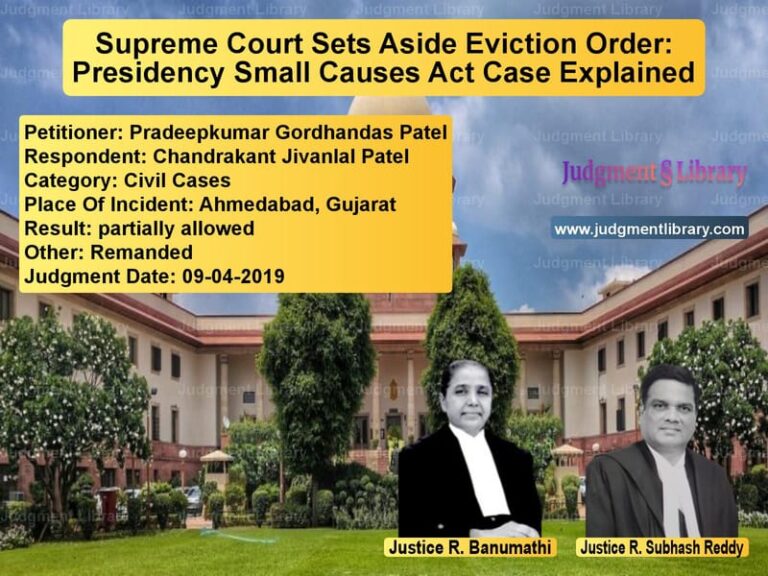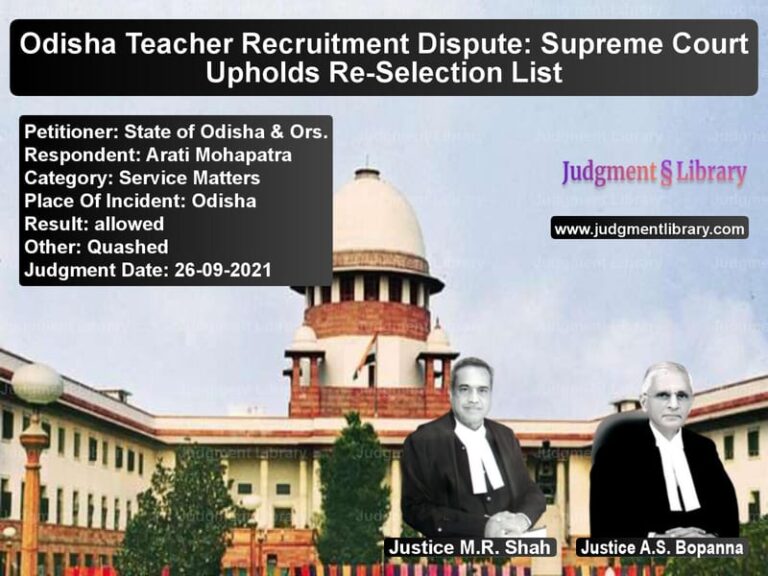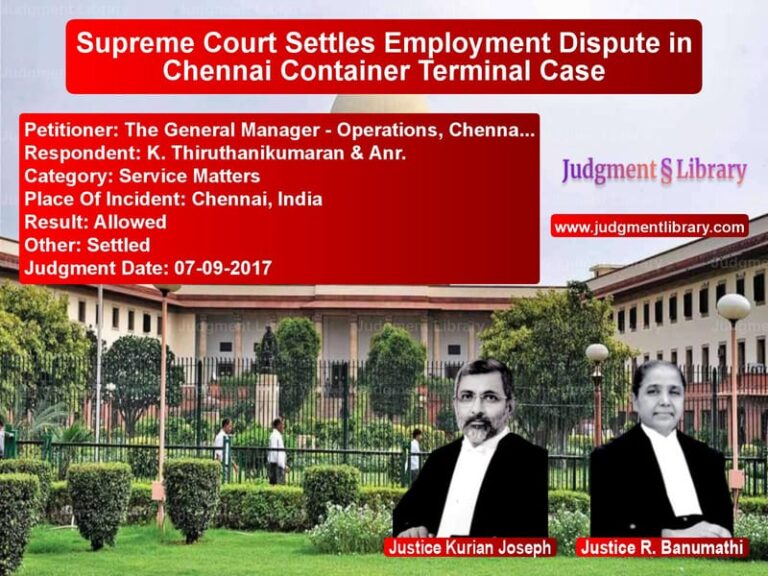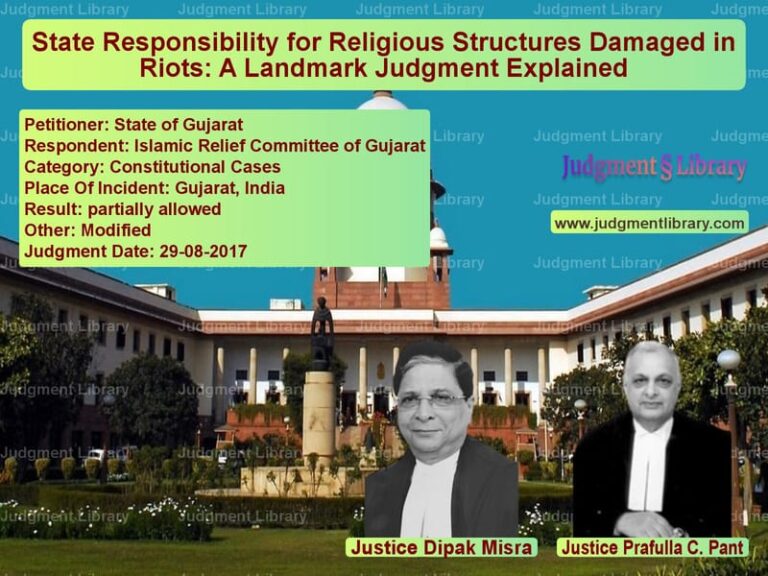Criminal vs. Civil Dispute: Supreme Court Quashes Cheating Charges in Vinod Natesan Case
The case of Vinod Natesan vs. State of Kerala & Ors. is a significant ruling in distinguishing between civil and criminal disputes. This appeal, arising from Criminal Appeal No. 1593 of 2018, was brought before the Supreme Court by the complainant, Vinod Natesan, challenging the Kerala High Court’s decision to quash criminal proceedings against the accused.
The central issue in this case was whether a business dispute, involving an alleged breach of contract and non-payment of dues, could be treated as a criminal offense under Sections 406 (Criminal Breach of Trust) and 420 (Cheating) of the Indian Penal Code (IPC). The judgment of the Supreme Court reaffirms the principle that criminal law should not be misused to settle civil disputes.
Background of the Case
The case originated from a commercial agreement between the complainant, Vinod Natesan, and the accused, wherein the accused availed of intellectual services for marketing the complainant’s products. The key events in the case were:
- The accused entered into a business agreement with the complainant.
- The accused allegedly failed to make full payment as per the agreement, paying only Rs. 1,50,000 out of the total Rs. 3,00,000 due.
- The complainant filed a criminal case against the accused under Sections 406 and 420 IPC.
- The accused approached the Kerala High Court under Section 482 of the Criminal Procedure Code (CrPC) to quash the criminal proceedings, arguing that it was a civil dispute.
- The Kerala High Court ruled in favor of the accused, quashing the criminal case.
- The complainant challenged the High Court’s decision before the Supreme Court.
Arguments Presented
Petitioner’s Arguments
The complainant, appearing in person, contended that the accused had committed criminal offenses by failing to fulfill contractual obligations. His key arguments included:
- “The accused did not act as per the agreement and failed to pay Rs. 3,00,000 due for the services rendered.”
- “The accused availed intellectual services but did not pay the full amount, which amounts to cheating.”
- “Since the accused did not serve one month’s notice before terminating the contract, it constitutes a criminal breach of trust.”
- “The Kerala High Court initially rejected the quashing petition but later allowed it, raising doubts about the legitimacy of the judgment.”
Respondent’s Arguments
The accused, supported by the State of Kerala, countered that:
- The dispute was purely civil in nature and did not amount to a criminal offense.
- Failure to pay dues under a contract does not constitute cheating or breach of trust under the IPC.
- The complainant had already filed a civil suit for recovery of the amount.
- Criminal law cannot be used as a tool to pressurize the accused into making payments.
Supreme Court’s Observations and Judgment
The Supreme Court, comprising Mohan M. Shantanagoudar and M.R. Shah, upheld the Kerala High Court’s decision to quash the criminal proceedings. The Court made the following key observations:
“Even considering the allegations in the FIR, the ingredients of Sections 406 and 420 IPC are not satisfied.”
The Court further ruled:
“The dispute between the parties is at best a civil dispute, which is being converted into a criminal case.”
The Supreme Court emphasized that:
- Non-payment of contractual dues does not amount to criminal breach of trust.
- Failure to serve notice before terminating an agreement does not constitute cheating.
- Business disputes must be resolved through civil courts, not through criminal litigation.
- The High Court had rightly exercised its powers under Section 482 CrPC to prevent abuse of the legal process.
Consequently, the Supreme Court dismissed the appeal and upheld the quashing of the criminal case.
Legal Significance of the Judgment
This ruling reinforces the principle that criminal law cannot be used as a substitute for civil remedies. The judgment sets an important precedent by:
- Preventing the misuse of criminal law for settling business disputes.
- Reaffirming that breach of contract is a civil matter unless there is clear fraudulent intent.
- Protecting individuals from being subjected to criminal proceedings in purely commercial disputes.
Conclusion
The Supreme Court’s decision in this case serves as a crucial guideline for distinguishing between civil and criminal liabilities. The ruling ensures that business disputes remain within the jurisdiction of civil courts and that criminal law is not misused to coerce settlements.
Final Verdict: The appeal was dismissed, and the quashing of the criminal case was upheld.
Petitioner Name: Vinod Natesan.Respondent Name: State of Kerala & Ors..Judgment By: Justice Mohan M. Shantanagoudar, Justice M.R. Shah.Place Of Incident: Kerala.Judgment Date: 11-12-2018.
Don’t miss out on the full details! Download the complete judgment in PDF format below and gain valuable insights instantly!
Download Judgment: Vinod Natesan vs State of Kerala & Or Supreme Court of India Judgment Dated 11-12-2018.pdf
Direct Downlaod Judgment: Direct downlaod this Judgment
See all petitions in Fraud and Forgery
See all petitions in Extortion and Blackmail
See all petitions in Judgment by Mohan M. Shantanagoudar
See all petitions in Judgment by Mukeshkumar Rasikbhai Shah
See all petitions in dismissed
See all petitions in Quashed
See all petitions in supreme court of India judgments December 2018
See all petitions in 2018 judgments
See all posts in Criminal Cases Category
See all allowed petitions in Criminal Cases Category
See all Dismissed petitions in Criminal Cases Category
See all partially allowed petitions in Criminal Cases Category







